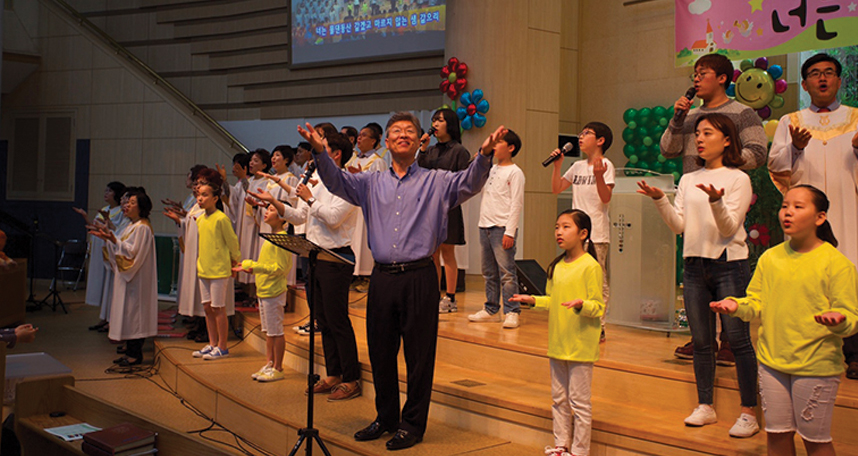Alumnus Dr. Woonjoo Baek Loves Being a Pastor

The second of four children, Woonjoo Baek was surrounded by his parents’ devout Christian faith. “Witnessing my parents offer their lives as a living sacrifice, fully committed to worship and obedience,” he said, “left a huge impression on me.”
From a young age, Woonjoo was active in a congregation related to the Korea Evangelical Holiness Church in Seoul, South Korea.
“I was deeply moved spiritually,” he recalled, “and was nicknamed ‘pastor’ by my peers. In 11th grade, I made a personal commitment to accept Jesus as my Lord and Savior, at which point I also dedicated myself to the mission of becoming a minister and attending seminary. I have never regretted my decision to pursue this path.”
After high school graduation, Woonjoo attended Seoul Theological University and received a Bachelor of Arts degree in theology, as well as a BA in English language and literature at Sungkyunkwan University. He was ordained in 1989 by the Korea Evangelical Holiness Church, the third-largest denomination in Korea.
“The Korea Evangelical Holiness Church,” Dr. Baek explained, “has a Wesleyan theological background. During my preparation to study in the States, I was looking for United Methodist-affiliated schools, but became particularly aware that Claremont School of Theology was full of renowned scholars such as John Cobb, James Sanders, and Greg Riley. I was interested in collaborating with people from diverse backgrounds and being exposed to various cultures, and as a result, without hesitation, I chose CST.
“During my 10 years at CST, I had an incredible and deeply personal experience from both an academic and campus life perspective.”
Beginning his CST studies in 1991, Dr. Baek earned Master of Divinity and Doctor of Ministry degrees in 1995 and 1997 respectively. He was admitted into the Bible and theology PhD program, but in the spring of 2001, he received a calling to be a senior pastor at a church in his home country.
“Although I was unable to complete the PhD program,” Dr. Baek said, “I was fortunate enough to be appointed as an adjunct faculty [member] and had the honor of teaching preaching during the fall semester of 2000.”
Today, Dr. Baek works from sunup to sundown.
“In Korea,” he said, “a pastor’s day begins at 4 a.m., with the exception of Sundays. Monday through Saturday, I lead a 5 a.m. worship service. After about an hour of worship and prayer, my wife and I kick off the rest of our day with a jog around the neighborhood trail. In addition to morning prayer service, Korean churches typically have Wednesday and Friday evening worship services throughout the week.” Four Sunday services – at 7, 9 and 11 a.m. and 2 p.m. – are offered. Throughout the week, various pastoral staff members prepare sermons, but on Sundays, the senior pastor preaches during all services.
“In Korean ministry,” Dr. Baek noted, “individual meetings and visits with members of the congregation are critical.” The pastoral staff will often visit community members in their homes or businesses, providing worship, prayer, and counseling. During the week, community group meetings, often led and encouraged by pastors, focus on Bible study.
Never has Dr. Baek regretted his decision to become a pastor.
“The most rewarding aspect of my work,” he said, “is to see members moved by God’s grace and to watch them changing into God’s people.”
When he was appointed to his current church, he knew its history of conflict and turmoil. Amid controversy, 500 members had left.
“The future was uncertain,” Dr. Baek admitted, “and I was not sure how to lead this divisive church. I was reminded that the church, as always, belongs to the Lord and prayed that God would move powerfully. I pressed on to the best of my ability to lead the church and rebuild it into one that is pleasing to the Lord.
“Fast forward through some grueling years, the church has completely recovered from its past struggles and is a healthy, joyful, and flourishing body of Christ. Witnessing the reconciliation of God’s people is the most rewarding part of ministry.
“As our church recovered from the difficult seasons,” Dr. Baek continued, “the congregation has come together in prayer, serving as devoted partners in ministry with conviction and commitment. The church body is united and proactive in serving core ministry initiatives such as worship, fellowship, community service, outreach, and international missions.”
Dr. Baek discounts any special talents as a minister. “One thing that I can offer as a senior pastor of a church, as well as the chair of the board of Seoul Theological University,” he said, “is the ministry philosophy that focuses solely on seeking after God’s own heart. I can testify that is why God continues graciously to use me.”
At Claremont School of Theology, Dr. Baek switched his major from New Testament to homiletics. Those courses, he said, “completely changed my outlook and the trajectory of my life as it pertained to studies and ministry. I attribute the change to the influence of Dr. Kathy Black. Meeting Kathy was a huge blessing and a pivotal moment in my life. The homiletics that I learned through her teachings was transformative and crucial in the following years in Korea in ministry and academia.”
His ministry, he said, is grounded on two Scriptural passages. The first is Proverbs 3:6: “In all your ways acknowledge him, and he will make straight your paths.” He also draws wisdom from 1 Corinthians 15:10: “But by the grace of God I am what I am, and his grace toward me has not been in vain. On the contrary, I worked harder than any of them – though it was not I, but the grace of God that is with me.”
Now a husband, father, and grandfather, Dr. Baek still believes that seeking and following God’s guidance is the only way.
“I have served with this belief my entire career,” he said, “and will continue to hold fast to this truth.”

